|
|  |
|
November 26, 2024
|
|
QUOTE
"The politics of envy is the politics of this commandment: 'Thou shalt not steal, except by majority vote.' It is the politics of two wolves and a sheep voting on what to have for dinner."
Gary North
Writer and economics historian, 1942-2022
|
|
UK - British Dairying - The plight of farmers today
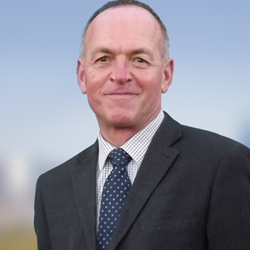 Comment from Michael Miller, Agriculture, Farms & Estates Partner at law firm Spencer West LLP.
Comment from Michael Miller, Agriculture, Farms & Estates Partner at law firm Spencer West LLP.
A number of my clients have been rightly exercised by the changes proposed to IHT on farms. And I was kept busy before the budget arranging transfers and assignments of farmland to the next generation when parents rightly feared the worst from the Chancellor due to all the rumours they were hearing.
DEFRA boss Steve Reed assures us that the changes were necessary to deter wealthy, non-farming investment buyers who were only interested in holding agricultural land because of the 100% APR relief. But if that's the justification I believe the proposed changes are disingenuous if Business Property Relief is also included within the £1m limit allowed for Agricultural Property Relief.
If APR is used to relieve farmland and buildings, then BPR is used when administering an estate to cover the livestock and machinery. A non-farming investment owner won't be holding livestock and machinery, just agricultural land.
As such it becomes apparent why the ordinary farmer feels beleaguered by the IHT changes since most family farms, once equipped with livestock and machinery, as well as land, are likely to exceed the limited allowances and be caught by the tax.
It becomes iniquitous if different people have to pay different amounts of tax when acquiring or disposing of the same class of property. Why should an elderly farmer, until now rightly told to hold title to the farm because his beneficiaries will inherit it at date of death value and free of IHT should now be faced with a tax bill, when his younger neighbour will have the luxury of time to gift the land?
www.spencer-west.com/team/michael-miller/
|
|
|
|
|
UK - The Budget - beneath the headlines
Join the Kite Consulting team for our latest podcast. Chris Walkland provides the milk market report and is joined by Tom Bradshaw, NFU President, Sean Rickard, an independent economic analyst and John Allen, Kite Director, to dig beneath the headlines of the Labour government's recent budget.
Tom, Sean and John discuss and debate the main headlines and their potential impact on dairy and the wider farming industry and food supply chain - including the increase in public investment, reduced BPS payments, changes in agricultural property relief, uplift in costs for employers and the consequences of an agriculture budget focused on environment.
www.kiteconsulting.com/podcasts/#/top/1
OR on our website www.britishdairying.co.uk/podcasts/
|
|
|
UK - Tabloids slam Starmer ' destroying the future of our farmers'
England rugby star and dairy farmer's son Phil Vickery also added his voice to critics of Labour's inheritance tax grab, declaring in an attack on 'the very backbone' of the UK.
The 48-year-old worked as a herdsman on his parents' farm in Devon before going on to win 73 caps for England. He is a qualified cattle inseminator and maintains strong links to the farming community. Speaking before last week's protest Vickery suggested moves to levy inheritance IHT on farms more than £1million would do immense damage to the sector.
"Keir Starmer is destroying the future of our farmers and their families,' he said in comments reported by Farmers Weekly. "This is a direct attack on our heritage and the very backbone of our country. I feel so let down and angry."
Speaking to reporters on the way to the G20 summit in Brazil, Sir Keir Starmer said 'it is very important that we support farmers' but he is 'confident' most will not be affected by the changes.
But this assertion has now been questioned by an expert in the agricultural property sector, who believes that nearly half of farms will exceed the £1million threshold based on the value of their land alone.
"If you just use bare agricultural land values, 40% of farms will be affected," says Rupert Burchett, an Agricultural Property solicitor at Payne Hicks Beach. "When you add on the value of farmhouses, diversified farm buildings and so on, that figure skyrockets. There is a real and understandable sense of betrayal in our rural communities. It doesn't matter how many times the Prime Minister repeats that the vast majority of farms and farmers will be unaffected - the Government's own figures show that this simply isn't the case."
A government spokesperson said: "Our figures, which are based on actual claims for Agricultural Property Relief, show that around three quarters of claims each year are expected to be unaffected by the changes. Looking at asset value alone does not necessarily mean that the farm will be affected, as it depends on individual circumstances.
"The figures are available for anyone to view online and have been assessed by the independent OBR. They show around 500 claims each year will be impacted and farm-owning couples can pass on up to £3m without paying any inheritance tax."
DailyMail
|
|
|
UK - Labour slumps to embarrassing by-election loss near Jeremy Clarkson's home amid tax row
Sir Keir Starmer's Labour Party suffered a humiliating defeat in a council by-election close to Jeremy Clarkson's home as fury mounted over the farming tax fiasco. The party's vote collapsed by a staggering 33.8%, allowing the Liberal Democrats to swoop in and gain the Chipping Norton seat from Labour on West Oxfordshire District Council.
Insiders believe voters abandoned Labour over the Government's "family farm tax". Clarkson has been a vocal critic of Chancellor Rachel Reeves's decision. A Tory source said: "The Lib Dems didn't seem to campaign that much from what we've seen and just took advantage of Labour supporters' frustrations I suspect.
"It's definitely blowback over recent decisions. Labour are normally very well organised and do well there." A Liberal Democrat source said: "This stunning win is another sign of the growing rural revolt over the Government's family farm tax."
Environment Secretary Steve Reed was forced to defend the Government's "crystal clear" figures on the number of farmers impacted by rises in inheritance tax. He remained adamant that "three quarters of farmers will pay nothing" because of changes announced as he faced questions from the Conservatives about whether the figures had been "checked before the Budget".
The National Farmers' Union (NFU) has disputed the Government's claims about the number of farms that will be impacted, warning that plans to roll together allowances for both IHT relief and business property relief could leave far more agricultural businesses exposed to the tax.
The presenter of Clarkson's Farm wrote of Sir Keir Starmer and Rachel Reeves in The Sunday Times: "If the word on the rural grapevine about a farmer's suicide is accurate, their policy, born of bitterness and envy, may already have tipped one man over the edge."
DailyExpress
|
|
|
UK - Country Land and Business Association (CLA) President Victoria Vyvyan said:
"The government claims to back farmers but their words seem hollow against a backdrop of tax rises, a cut in real terms to the agriculture budget and a speeding up of the end of direct payments.
"Failure to increase the budget will leave farmers unable to deliver on food security or the government's environmental commitments. It will hit sustainable food production and undermine improvements to wildlife habitats, flood management and access to nature.
"Ministers are still saying that capping vital inheritance tax reliefs only affects the wealthiest, but the Chancellor's tax grab may endanger as many as 70,000 farms - from the average family farm up to our biggest food producers. If just 5% of rural businesses fail, it could lead to tens of thousands of job losses in the rural economy. So much for a government that claims to have economic growth at its heart."
CLA
|
|
|
UK - AHDB dairy retail performance
During the 52 weeks ending 2 November 2024, volumes of cow's dairy declined by 0.6% year-on-year (NIQ Homescan POD, Total GB).
Growth in average prices (+0.5%) was not quite enough to balance volume losses as spend on cow's dairy declined 0.1% according to Nielsen.
Spend on cow's milk continues to decrease (-6.3%) and volumes declined by 1.8% year-on-year (52 w/e 2 November 2024). Semi-skimmed cow's milk accounts for 59.6% of volume sales but contributed most to the decline, while whole milk continued to see growth (+2.3%), driven by an increase in buyers as well as an increase in purchase frequency.
Cow's cheese remains in growth with volumes up 3.8% year-on-year, and spend to rising by 3.2% (NIQ Homescan POD, Total GB). Cheddar saw a 4.1% increase in volumes sold driven by an increase in volume per shop up 2.9%. This drove cow's cheese performance as cheddar accounts for 41.7% of all cow cheese sold. Cow cheese other also saw strong growth driven by cottage cheese.
Cow's butter saw a volume decline of 3.5%, despite a decrease of average prices (-0.2%). However, block butter saw volumes increase by 6.0%. Plant-based spread volumes increased, likely due to switching gains from cow's butter as they were £2.06/kg cheaper.
Volume sales of cow's yoghurt, yoghurt drinks and fromage frais continue to grow, now up 6.4% and spend increased by 8.2%. Despite increasing prices, most of the cow's yoghurt categories saw volume growth. Standard plain yoghurts grew the fastest, up 22.7% while healthy yoghurts saw the largest increase up 10.7 thousand tonnes year-on-year (NIQ Homescan POD, Total GB).
Cow's cream volumes grew by 2.5% year-on-year, primarily driven by existing shoppers buying more. Double, sour cream and crème fraiche all experienced volume growth.
See the full data and these insights visualised on AHDB's GB household dairy purchases retail
|
|
|
UK - Q3 dairy trade review: export growth for cheese but powders struggle
Key trends
- Total UK dairy export volume for Q3 2024 declined by 2.5% year-on-year at 274,300 tonnes
- Growth in exports of cheese and curd, whey and whey products were outweighed by decline in exports of powders, milk and cream, butter and yoghurt
- Total UK dairy import volume for Q3 2024 grew by 13.3% year-on-year at 330,600 tonnes
- Yoghurt and cheese continue to dominate year-on-year increase in the import basket and others also trend up except for powders
Boost in cheese and whey exports while others roll down
Total export volumes of dairy products from the UK for Q3 2024 were 274,300t, a decline of 7,100t (2.5%) year-on-year. This is the lowest quarterly volume recorded in the last two years. Exports of dairy products to the EU declined by 4,100t and that to non-EU nations declined by 2,900t during the period.
This was primarily driven by a sharp decline in exports of powders which fell by 9,800t (30.7%). Milk and cream as well as butter also declined by 1,800t (1.0%) and 1,600t (13.3%) respectively, and yoghurt declined by a smaller 700t (7.2%).
In contrast to that, cheese and curd, whey and whey products continued to grow year-on-year. Cheese and curd saw the largest year-on-year increase, up by 4,700t (10.7%) mostly destined for EU nations. This was followed by whey and whey products which grew by 2,000t during the period. In EU, the largest chunk of the exports was to Ireland (9,800t) followed by Netherlands (6,000t). Increasing exports of cheese reflects increased efforts to boost British prospects overseas.
At a total dairy level EU nations constitute nearly 90% of the total UK exports. Countries including Ireland, Netherlands, France, Belgium, Poland, Germany are the major recipients. In Q3 2024, exports to Poland declined by 39% to 2,400t, Belgium declined by 22% to 7,200t and the Netherlands declined by 10% to 17,100t on Q3 2023. Exports to Germany increased by 56% to 3,900t and France increased by 11% compared to Q3 2023 to 9,200t. Exports to non-EU countries like Peru, Nigeria, Morocco, Canada and Asian countries also declined during the period.
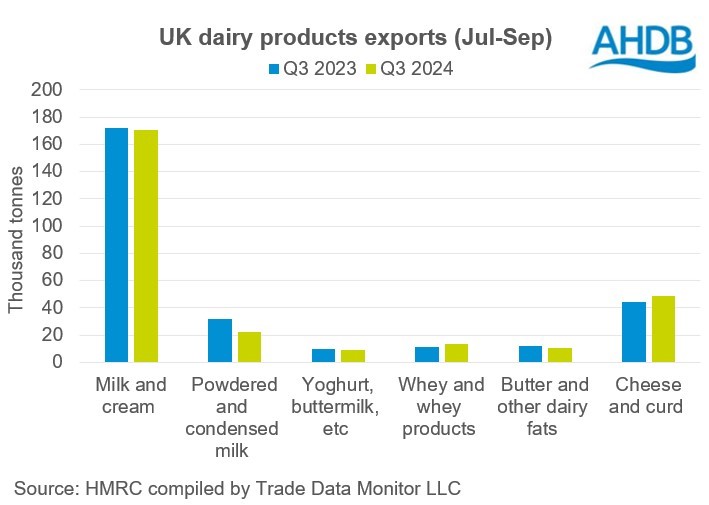
Read more on the AHDB website
|
|
|
UK - Risk to dry cows from high potassium silages
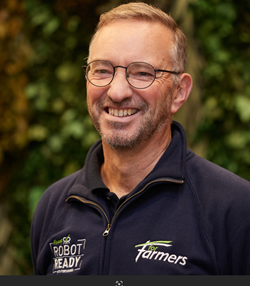 Mineral analysis of grass silage from the three years from 2022 to 2024 has shown some pronounced trends which dairy farmers need to think about when rationing their dry cows in particular.
Mineral analysis of grass silage from the three years from 2022 to 2024 has shown some pronounced trends which dairy farmers need to think about when rationing their dry cows in particular.
"The potassium content of grass silage has trended up by 8.39% since 2022," says Bruce Forshaw, ForFarmers Product Manager. "Potassium is a major cation, so increased levels will affect the dietary cation-anion balance, known as DCAB, of a diet.
"You are aiming for a low DCAB diet for dry cows that encourages an animal's hormone system to mobilise calcium from her bones, ensuring she has enough available calcium at the point of calving. She will naturally start to mobilise calcium when she calves but there can be a 48-hour lag time and this is when clinical and sub clinical milk fever can occur," explains Bruce.
"During the same period chloride (anion) in silages has been trending down which will also affect the DCAB value of the forage. If your silage analysis is showing these issues look to add more low DCAB forages such as wholecrop, straw, maize or more mature grass silages that didn't receive much slurry.
"We know how important it is to get nutrition spot on when rationing dry cows, so a mineral analysis of all forages is essential, especially this year," Bruce concludes.
ForFarmers
|
|
|
UK - Forage analysis flags nutritional shortfalls at Wynnstay's Sheep and Beef Event
Hay and grass silage quality has suffered this year, meaning producers will need to supplement their livestock feed carefully. That's according to analysis of forage samples at the recent Wynnstay Beef and Sheep Event held at Welshpool Livestock Market. Around 1,000 farmers attended the bi-annual event, which brought together experts and industry leaders to share knowledge, discuss the latest trends, and explore innovative practices in the livestock industry.
The opportunity to submit forage samples for testing highlighted crucial issues like low protein content, high fibre levels, and poor fermentation quality, sparking discussions on how to address these areas for improved livestock performance. Overall, the quality of forages submitted for sampling were below target, highlighting the need for careful supplementation with energy and protein this coming winter.
The analysis of hay, grass silage, maize and whole crop silage highlighted that strategic adjustments will be required to help farmers maximise the nutritional value of their rations. "Understanding your forage's profile is the first step in optimising herd or flock health and productivity," said Bryn Hughes, Wynnstay's National Sheep and Beef Manager.
Hay samples revealed crude protein (CP) levels averaging only 6.5%, falling below the ideal 8-11% range. "The low CP levels are concerning," Hughes pointed out. "Mature, late-cut grasses divert nutrients to structural carbohydrates, which lowers protein content. Farmers must balance this with protein supplements to maintain livestock performance."
The grass silage analysis pointed to similar concerns, showing CP levels at an average of 9.3%, significantly below the target range of 12-16%. High pH levels, averaging 4.6, further compounded the issue.
"Elevated pH allows clostridia to break down protein into ammonia, rendering it less useful to livestock and diminishing the feed's nutritional value," he explained. "This can negatively affect growth rates and cause health issues."
Neutral detergent fibre (NDF) and lignin levels in grass silage were notably high at 68.3% and 6.3%, respectively, indicating a harvest of overly mature grass. "Excessive NDF means more structural carbohydrates, which slow digestion and reduce feed intake," Hughes commented.
Additionally, butyric acid levels averaged 0.6%, exceeding the desired less than 0.1% threshold, indicating poor fermentation and suboptimal silage preservation, which can compromise feed quality. To address these issues, he highlighted essential management practices. "Supplementing lower-protein forage with high-protein feed is necessary to sustain livestock productivity," he advised, "and incorporating yeast metabolites can aid fibre digestion and support rumen health, making fibrous silage more manageable."
Although farmers can't predict the weather, the key to better silage next year lies in its preparation. "Adjusting the timing of cuts, ensuring rapid wilting and tightly packed clamps to exclude oxygen can prevent harmful bacterial activity and preserve protein integrity," he said. "Small but significant changes can greatly enhance feed quality and animal performance."
Tips on balancing rations/improving forage/optimal cutting/better silage consolidation and more: visit: Agricultural Products and Services for UK Farmers | Wynnstay Agriculture
|
|
|
UK - Get set for the festive season with CalfChat's 12-days of Christmas giveaway
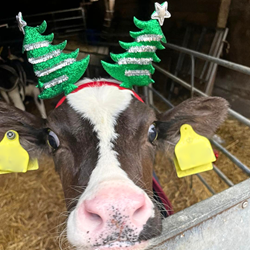 Sign up today for Bonanza Calf Nutrition's 12 days of Christmas giveaway which has some amazing gifts for everyone's dairy farming wish list!
Sign up today for Bonanza Calf Nutrition's 12 days of Christmas giveaway which has some amazing gifts for everyone's dairy farming wish list!
Simply subscribe to the CalfChat newsletter - www.calfchat.com/12-days-of-xmas/ - by the end of November to be entered into the 12-days of Christmas prize draw. Prizes will be given away each day from 1st - 12th December ranging from calf jackets to a Trusti-tuber.
CalfChat is an educational platform for anyone looking after calves; it operates at www.calfchat.com and on social media platforms. The newsletter pulls together some of the best, newest and relevant information on subjects ranging from minimising disease at housing to storing, freezing and feeding colostrum.
Lots of prizes to be won: 2 Shine calf jackets; Heat lamp; Pedal-along-tractor (for the smaller farmer in your life); Cadbury's chocolate; CalfChat hat; Shine jug and whisk; Shine mug; Weigh scales; £50 Fairfax and Favour voucher; Trusti-tuber; Refractometer; Shine Original hoody.
Simply register at www.calfchat.com/12-days-of-xmas/ by the end of November to be in with a chance of winning. Full terms and conditions are available at www.calfchat.com
|
|
|
UK - Farmers charging £272 for a flat white to fund 'sustainable future'
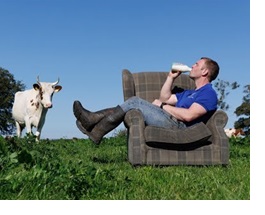 A dairy farm in Scotland is charging punters £272 for a flat white in a bid to fund a "sustainable future". Mossgiel Farm unveiled the UK's most expensive coffee to fund a zero-waste dairy facility and challenge 'Big Dairy' by implementing eco-friendly practices such as eliminating single-use plastics and keeping calves with their mothers.
A dairy farm in Scotland is charging punters £272 for a flat white in a bid to fund a "sustainable future". Mossgiel Farm unveiled the UK's most expensive coffee to fund a zero-waste dairy facility and challenge 'Big Dairy' by implementing eco-friendly practices such as eliminating single-use plastics and keeping calves with their mothers.
The £272 coffee drink consists of espresso and steamed milk from Mossgiel Farm in Mauchline, Ayrshire. Previously, the most expensive coffee in the UK was a £265 flat white at Shot London in Mayfair, made with Japanese Typica beans and served in an elaborate gold-plated V60. It's all part of Mossgiel Farm owner Bryce Cunningham's bold drive to raise funds for a state-of-the-art, zero-waste dairy facility, which will give them the backing needed to revolutionise the way we consume milk.
As well as getting a tasty coffee, punters will be handed 34 shares in Mossgiel Farm as part of the deal. Bryce Cunningham, who was the only dairy CEO to accept an invitation to go head-to-head with Oatly in a debate about the sustainability of farming on Reddit, said: "Sometimes it takes a little shock factor to make people think differently.
"This coffee costs nearly 80 times the price of an average flat white in the UK - but it's much more than just a lovely drink. You're investing in a sustainable future for farming and joining a movement that's changing the dairy industry. We know it sounds crazy, but when you break it down, it's a pretty good deal.
"How much is the future of farming worth?"
With more than £117,000 raised already, the farm's nearly halfway towards its £272,000 crowdfunding goal to fund a new facility which will allow Mossgiel to double production and expand into new markets, like London. For more information on Mossgiel's crowdfunding campaign and to sign up for the £272 flat white, visit Crowdcube.
TheLondonEconomic.com
|
|
|
Diary date: January Semex Conference
The Semex International Dairy Conference will once again take place in Glasgow in January.
Kick starting the New Year and bringing together the dairy industry, the 2025 Semex Conference promises to provide the setting where our delegates can gain knowledge, share opinions and debate with colleagues and friends.
AsOne Together, our speaker line-up are all experts in their area, from end-to-end of the food chain and will share their experience, knowledge, views, plans and outlook for the future.
The conference will be held from Sunday 12th to Tuesday 14th January 2025, in the Radisson Blu Hotel in the heart of Glasgow.
For more information
|
|
|
UK - Volac expands business manager team in Scotland and England
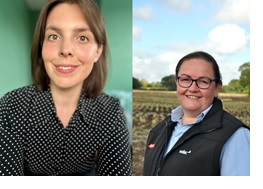 Amanda Clements & Freya Webber
Amanda Clements & Freya Webber
Leading forage preservation and animal nutrition business, Volac, has expanded its silage additive commercial team in Scotland and Northern England, and Central and Eastern England, with the appointment of two new Technical Business Managers.
Freya Webber is the new Technical Business Manager for Scotland and Northern England: Responsible for merchant support and on-farm technical sales for the Ecosyl additive range plus related products for the whole of Scotland and Northern England, Freya Webber brings seven years' experience in the livestock sector, having previously worked in veterinary diagnostics.Originally from a farming community in the far north of Scotland but now based between Glasgow and Edinburgh, Freya also holds a BSc in Animal Biology.
Amanda Clements is the new Technical Business Manager for Central and Eastern England: Responsible for merchant support and on-farm technical sales for the Ecosyl additive range plus related products for Central and Eastern England, Norfolk-based Amanda Clements brings 18 years' experience of working in the livestock sector, and a BSc in International Agriculture, specialising in dairy nutrition.
Volac
|
|
| |
BRITISH DAIRYING
ENSURE YOU RECEIVE EVERY COPY
British Dairying is available by subscription at £70.00 posted to UK addresses,
£90.00 for Europe, £115.00 for the Rest of the world
or £30 +VAT for British Dairying Online only
|
|
| |
QUOTE
"Envy is always referred to by its political alias, 'social justice'."
Thomas Sowell
Economist and social philosopher
|
|
| |
|
|
|
You are receiving this email because you are a registered reader of British Dairying and we are pleased to send you extra information to supplement the journal.
|
|
|
|
|
British Dairying,
WB Publishing Ltd
Priory Cottage, Eastbourne Road Ridgewood East Sussex TN22 5ST
WB Publishing Ltd is registered in England and Wales, Registration No 2951727
|
|

 Comment from Michael Miller, Agriculture, Farms & Estates Partner at law firm Spencer West LLP.
Comment from Michael Miller, Agriculture, Farms & Estates Partner at law firm Spencer West LLP.


 Mineral analysis of grass silage from the three years from 2022 to 2024 has shown some pronounced trends which dairy farmers need to think about when rationing their dry cows in particular.
Mineral analysis of grass silage from the three years from 2022 to 2024 has shown some pronounced trends which dairy farmers need to think about when rationing their dry cows in particular.
 Sign up today for Bonanza Calf Nutrition's 12 days of Christmas giveaway which has some amazing gifts for everyone's dairy farming wish list!
Sign up today for Bonanza Calf Nutrition's 12 days of Christmas giveaway which has some amazing gifts for everyone's dairy farming wish list!
 A dairy farm in Scotland is charging punters £272 for a flat white in a bid to fund a "sustainable future". Mossgiel Farm unveiled the UK's most expensive coffee to fund a zero-waste dairy facility and challenge 'Big Dairy' by implementing eco-friendly practices such as eliminating single-use plastics and keeping calves with their mothers.
A dairy farm in Scotland is charging punters £272 for a flat white in a bid to fund a "sustainable future". Mossgiel Farm unveiled the UK's most expensive coffee to fund a zero-waste dairy facility and challenge 'Big Dairy' by implementing eco-friendly practices such as eliminating single-use plastics and keeping calves with their mothers.
 Amanda Clements & Freya Webber
Amanda Clements & Freya Webber

